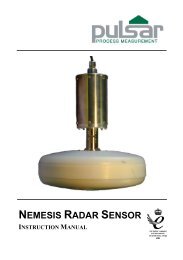FlowCERT
Flow Cert Second Edition.pdf - Pulsar Process Measurement
Flow Cert Second Edition.pdf - Pulsar Process Measurement
- No tags were found...
Create successful ePaper yourself
Turn your PDF publications into a flip-book with our unique Google optimized e-Paper software.
Pump Duty<br />
Description<br />
8= First On First Off, The first pump switched on is the first<br />
alternate duty assist pump to be switched off, etc. regardless<br />
of the set points, so the setpoints are<br />
dynamically changed to enable this.<br />
9 = Service Ratio Standby When a service ratio duty is being used,<br />
on all other pumps in use, the standby<br />
pump can be started on a ratio basis<br />
only, when it will assume the setpoints<br />
of the next pump to start. The third<br />
setpoint (P215, 225, 235, 245, 255) is<br />
used to set the service ratio.<br />
10 = Two Pump Sets There are four pumps. Two rotate their<br />
start-up sequence with each other. If the<br />
two pumps cannot keep up, the level rise<br />
to the setpoints of the other two pumps<br />
which take over and rotate their<br />
sequence with each other.<br />
Important Information<br />
The pumps are started and stopped at the “ON” and “OFF” setpoints. To<br />
pump down (reduce level) then set “ON” higher than “OFF”. To pump up<br />
(increase level) then set “ON” lower than “OFF”.<br />
The third parameter for each relay determines the pump group. You can<br />
have two groups of pumps, and all similar duties within that group will<br />
operate together.<br />
P212, P222, P232, P242, P252 - Relay Pump Group<br />
By default, all pump groups are set to 1, but if you want to have another<br />
group, then set this parameter to 2, for each pump relay that should operate<br />
together as part of a second group.<br />
Page 101









